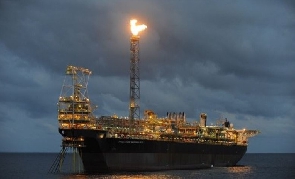 File photo [FPSO Nkrumah vessel]
File photo [FPSO Nkrumah vessel]
Global demand for transportation fuel will remain below trailing five-year average levels beyond 2021, barring a speedier resolution to both the COVID-19 pandemic and trade tensions among the largest oil consuming nations, international rating agency Moody’s has said.
“Mitigating these risks effectively would accelerate the oil market’s recovery,” it added.
It said the pandemic will have a lasting impact on how people travel, work and spend money, adding that even with effective policy responses from governments around the world and major vaccine and therapeutic breakthroughs, a significant portion of the population may remain fearful for a while and not go back to running their lives as they did before.
Moody’s said it is still unclear how long it could take to fully eradicate the coronavirus.
“Meanwhile, lower demand would also necessitate continued producer discipline to support prices. Any major escalation in trade wars between major economic powers, particularly the US, China and the EU, will also discourage spending, investments and industrial activity, thereby limiting oil demand and prices,” it argued.
Oil prices have stabilised around US$40/barrel (bbl) since July 2020, after averaging US$30/bbl during the second quarter of 2020.
Moody’s base case oil price assumption is an average of US$40/bbl in 2021 for West Texas Intermediate (WTI), the North American benchmark crude, rising towards a US$45-65/bbl medium-term price band after that.
Benchmark Brent crude prices are expected to have a US$5 average premium over WTI prices through 2021.
M&A to gain steam
The situation, according to Moody’s, will spark mergers and acquisitions (M&A) through 2021, with stronger companies leading the charge.
However, it said companies will look for compelling strategic rationales before engaging in major M&A deals, instead prioritising debt reduction, dividend increases, share repurchases or growth spending that they had paused in early 2020.